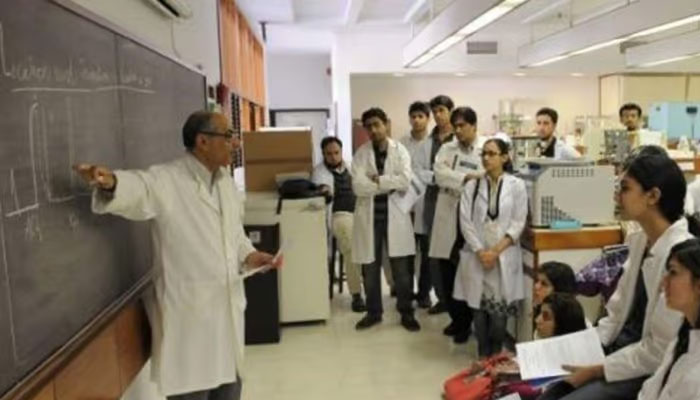ISLAMABAD – The Pakistan Medical and Dental Council (PMDC) has decided to decrease the minimum passing marks and provide relaxation in attendance requirement to students of medical colleges.
The council has decided to set the passing marks at 65 percent as compared to previous 70%. Similarly, the minimum attendance requirement has been fixed at 85% as previously it stood at 90%.
The revised academic regulation will be applicable to students of all classes in medical colleges.
The revision comes weeks after the minimum marks and attendance were fixed at 70% and 90% respectively.
Earlier, the government of Pakistan has set a fee limit for MBBS and BDS programmes.
As per reports, the Medical Education Reforms Committee, formed on the directives of the Prime Minister and led by the Deputy Prime Minister, has taken a major decision to cap the annual tuition fee for private medical and dental colleges at Rs1.8 million. This initiative aims to make medical education more affordable and accessible in Pakistan.
Rising tuition fees in private medical colleges have long been a concern for students, parents, and the public.
The PM&DC Council previously discussed this issue in meetings held on June 4, 2022, December 10, 2023, and February 23, 2024.
On February 27, 2025, the Council formed a subcommittee under Professor Dr. Masood Gondal, which conducted a detailed review through consultations with stakeholders, including representatives from private institutions and the Pakistan Association of Medical Institutions (PAMI).
Read more: PMDC Alerts Public About Fake Aesthetic Practitioners
After a thorough financial review, the Medical Education Reforms Committee decided to fix the annual tuition fee at Rs1.8 million, with future increases linked to the Consumer Price Index (CPI). This fee structure will apply for five years for MBBS and four years for BDS and will be publicly announced to ensure transparency.
However, institutions requiring a higher fee (up to Rs2.5 million) must justify their request to PM&DC by providing detailed financial reports, educational facilities, and service comparisons. Unnecessary fee hikes will not be accepted, and only reasonable requests will be considered to prevent excessive financial burden on students.
This decision is seen as a landmark step in making medical education affordable, especially for middle- and lower-income families. The Government of Pakistan remains committed to strengthening medical education reforms to ensure equal opportunities for all deserving students.
The committee acknowledged the Deputy Prime Minister’s leadership and efforts in achieving this milestone.




Comments are closed, but trackbacks and pingbacks are open.